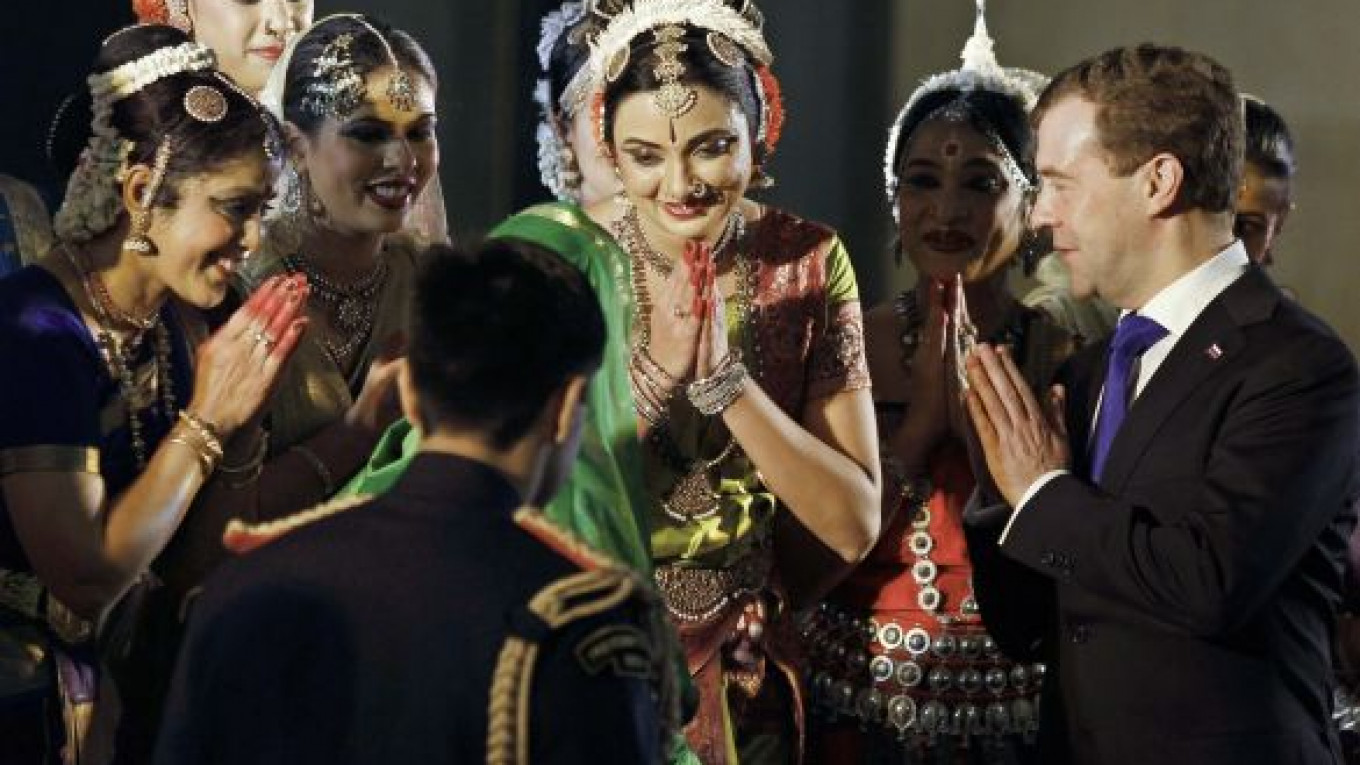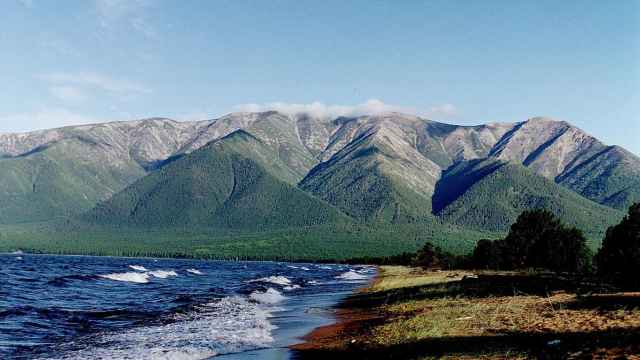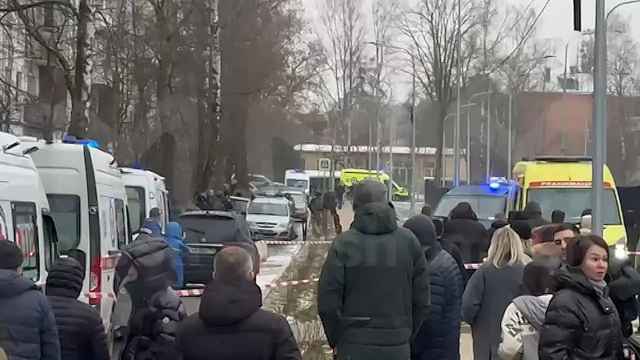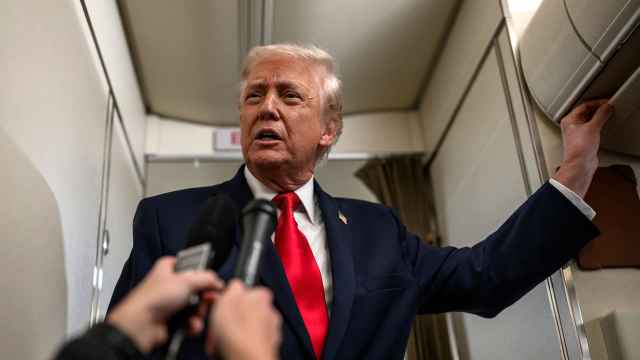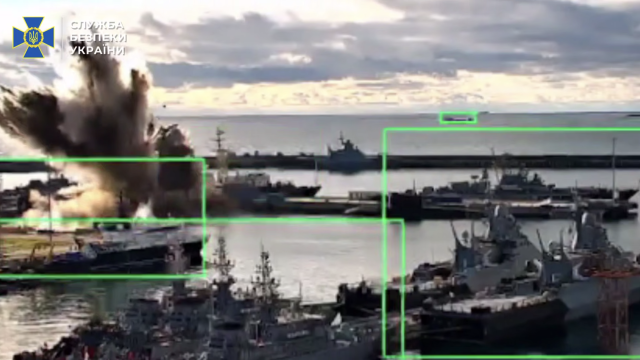President Dmitry Medvedev and his delegation of more than 100 business leaders wrapped up the second day of their visit to India on Tuesday by signing over 20 agreements, including fine-tuning the design of advanced fighter jets that will be jointly manufactured.
Medvedev spoke of the “privileged partnership” between New Delhi and Moscow and praised the “special affinity, friendship and predictability in our relationship” during a press conference with Indian Prime Minster Manmohan Singh, who accepted the president’s invitation to visit Russia next year.
Medvedev met with Singh and ruling Congress Party head Sonia Gandhi for almost two hours in New Delhi on Tuesday.
“India is a very attractive bride, and everyone is trying to date her,” said Ruslan Pukhov, director of the Center for Analysis of Strategies and Technologies in Moscow. “We used to be, we are, and it looks as if in the near future we will be the No. 1 supplier in India.”
According to the Russian Center for Analysis of International Weapons Trade, India will account for 54 percent of Russian arms exports from 2010 through 2013, estimated at more than $15 billion.
The contract signed between Rosoboronexport and Hindustan Aeronautics Limited relates to the design modifications for fighters to be bought by India. The value of the entire contract is unofficially estimated to be about $30 billion. Each of the expected 300 jets will cost between $85 million and $100 million, with deliveries to begin in 2017.
More than 20 agreements were announced during President Dmitry Medvedev’s visit to India, including:
- The Federal Property Management Agency paid $600 million for a 17 percent stake Sistema Shyam TeleServices, AFK Sistem’s telecommunications venture in India.
- AFK Sistema said it may team up with India’s Oil and Natural Gas Corp., whose bid for the Trebs and Titov oil field was refused but is looking to expand in Russia.
- India’s Reliance Industries and Sibur will invest an estimated $450 million in a joint venture starting 2013 to produce butyl rubber in the Indian city of Jamnagar.
- Foreign Minister Sergei Lavrov signed a deal with his Indian counterpart simplifying some visa categories.
- Education and Science Minister Andrei Fursenko signed a document founding the Russian-Indian Technological Center.
- The president of the Skolkovo Innovation Project, Viktor Vekselberg, signed a memorandum of understanding with India’s Tata Group.
— MT
Reflecting a growing trend toward local sourcing and technology transfer, the core elements are being developed by Sukhoi while the Indian partner will be involved in some technical aspects of the project including electronics, navigation systems, cockpit displays and the development of a two-seater version of the fighter.
Indian leaders also reaffirmed a commitment to provide a site for a third nuclear power plant to be built by Russia, said Rosatom head Sergei Kiriyenko. Analysts say the new project has a potential price tag of $24 billion and will also involve local supplies and manufacturing.
Though facing competition from Japanese, French and U.S. firms, “over the next 15 years there is a significant chance that every second reactor that Russia builds abroad will be built in India,” said Anton Khlopkov, Director of the Center for Energy and Security Studies.
There are already two nuclear facilities under construction by Rosatom in India, with one reactor at the Kudankulam plant expected to be commissioned in the first quarter of 2011. There will be up to six reactors built at each site.
In the aerospace and defence sector, a deal was signed in which Russia will supply missiles to the Indian army. No financial details were released. Medvedev also highlighted Indian-Russian cooperation over the Chandrayaan-2 spacecraft and the Glonass satellite navigation system.
An energy agreement was signed by Energy Minister Sergei Schmatko and Oil and Natural Gas Minister Murli Deora committing the two countries to broader cooperation in the oil and gas sphere, including liquefied natural gas.
On Monday, Medvedev said in an interview with the Times of India that Russia was considering the possibility of participation in a gas pipeline that will connect Turkmenistan, Afghanistan, Pakistan and India.
Geopolitical discussions also touched on regional problems. The Kremlin said in a press release that Russia and India were looking “to create an anti-terrorist and anti-narcotic belt” around Afghanistan. Russia held a rare joint battalion-level counter-terrorism exercise with India in October.
Following Washington and Paris, Medvedev expressed support for India's bid to join the United Nation's Security Council, whose five permanent members include the United States, Britain, France, Russia and China.
The Soviet Union traditionally had very strong ties with India in the fields of defense and energy. Analysts say the relationship suffered after the breakup of the U.S.S.R. and is now under pressure because of other countries’ attention to India’s emerging market potential.
But the two countries still have a lot in common including a “deep mistrust of China and combatting Islamic militants,” said Pukhov, of the Center for Analysis of Strategies and Technologies.
“We are complimentary, and we feel very comfortable with India,” he added.
Medvedev said Tuesday that bilateral trade will increase by 50 percent over this year’s figure to reach $15 billion in 2015, but this pales in comparison with Russia’s trade volumes with Europe or China.
Russia's trade with the European Union was worth $246 billion in the first 10 months of 2010, and $47.5 billion with China for the same period.
Other countries are getting on line for a slice of the Indian pie. British Prime Minister David Cameron visited India in July, followed by U.S. President Barack Obama, French President Nicolas Sarkozy and Chinese Premier Wen Jiabao. Each visit resulted in announcements of business deals worth billions of dollars.
Analysts assert that the Indian market is large and growing. “The sky is big,” said Pukhov, quoting a Russian proverb, “and there is enough of it for everyone.”
A Message from The Moscow Times:
Dear readers,
We are facing unprecedented challenges. Russia's Prosecutor General's Office has designated The Moscow Times as an "undesirable" organization, criminalizing our work and putting our staff at risk of prosecution. This follows our earlier unjust labeling as a "foreign agent."
These actions are direct attempts to silence independent journalism in Russia. The authorities claim our work "discredits the decisions of the Russian leadership." We see things differently: we strive to provide accurate, unbiased reporting on Russia.
We, the journalists of The Moscow Times, refuse to be silenced. But to continue our work, we need your help.
Your support, no matter how small, makes a world of difference. If you can, please support us monthly starting from just $2. It's quick to set up, and every contribution makes a significant impact.
By supporting The Moscow Times, you're defending open, independent journalism in the face of repression. Thank you for standing with us.
Remind me later.



